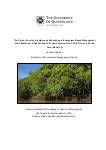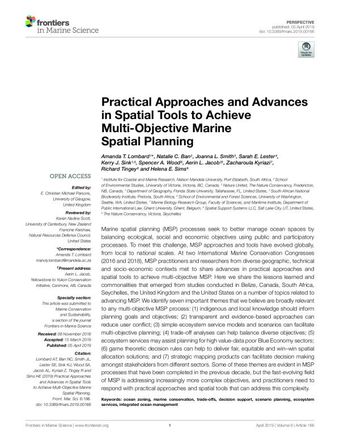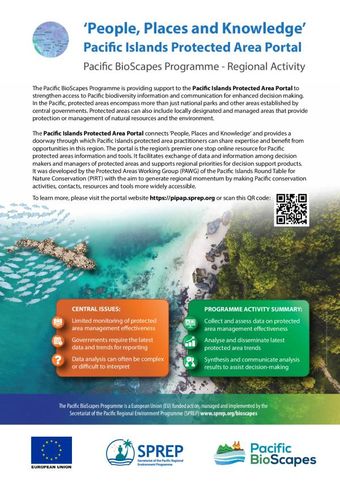Learning ecosystem complexity: a study on small-scale fishers' ecological knowledge generation
- Description:
- Small-scale fisheries are learning contexts of importance for generating, transferring, and updating ecological knowledge of natural environments through everyday work practices. The rich knowledge fishers have of local ecosystems is the result of the intimate relationship fishing communities have had with their natural environments across generations (see e.g. Urquhart and Acott 2013). This relationship develops strong emotional bonds to the physical and social place. For fishing communities and fishers who depend directly on local ecosystems to maintain their livelihoods fishing environments are natural places for living, working and defining themselves. Previous research on fishers ecological knowledge has mainly been descriptive, i.e., has focused on aspects such as reproduction, nutrition and spatial-temporal distribution and population dynamics, from a traditional view of knowledge that only recognises scientific knowledge as the true knowledge. By doing this, fishers ecological knowledge has been investigated separately from the learning contexts in which it is generated, ignoring the influence of social, cultural and historical aspects that characterise fishing communities, and the complex relationships between fishers and the natural environments they live and work in. This thesis investigates ecological knowledge among small-scale fishers living and working in the ecosystems of Lake Vättern and the Blekinge Archipelago (Baltic Sea) in Sweden and explores how ecological knowledge is generated with particular regard to the influences of work and nature on fishers knowledge of ecosystems. The aim of this thesis is to contribute to the knowledge and understanding of informal learning processes of ecosystem complexity among small-scale fishers. This knowledge further contributes to the research field of ecological knowledge and sustainable use and management of natural resources. It addresses the particular research questions of what ecological knowledge fishers generate, and how its generation is influenced by their fishing work practices and relationships to nature. The thesis consists of three articles. Article I focuses on the need to address the significant lack of theoretical and methodological frameworks for the investigation of the cognitive aspects involved in the generation of ecological knowledge. Article II deals with the need to develop theoretical, methodological and empirical frameworks that avoid romanticising and idealising users ecological knowledge in local (LEK), indigenous (IEK) and traditional (TEK) ecological knowledge research, by rethinking it as being generated through work practices. Article III addresses the lack of studies that explicitly explore theories linking complex relations and knowledge that humans form within and of ecosystems. It also addressed the lack of attention from environmental education researchers to theory and empirical studies of sense of place research, with a particular focus on environmental learning. Research into the question of what ecological knowledge fishers generate shows differences in their ways of knowing ecosystem complexity. These differences are explained in terms of the influences of the species being fished, and the sociocultural contexts distinguishing fishers connection to the fishing profession (i.e., familial tradition or entrepreneurship) (Article I), but also by the fishing strategies used (Article II). Results answering the research question of how work practices influence fishers knowledge of ecosystem complexity show a way of rethinking their ecological knowledge as generated in a continuous process of work (Article II), thus, far from romantic views of knowledge. Results answering the research question of how fishers relationships to nature influence their knowledge of ecosystem complexity demonstrate the complex interconnections between psychological processes such as identity construction, proximity maintenance and attachment to natural environments (Article III). Finally, more similarities than differences between fishers knowledge were found, despite the variation in cases chosen, with regards to landscape, target species, regulations systems and management strategies, fishing environments scales, as well as cultural and social contexts.
- Display date:
- 2016
- Collections:
- Secretariat of the Pacific Regional Environment Programme (SPREP)
- Publisher:
- Swedish University of Agricultural Sciences
- Content partner:
- Secretariat of the Pacific Regional Environment Programme (SPREP)
- Availability:
- Not specified
-
Copyright status: All rights reservedFind out more about what you are able to do with this itemThis item is all rights reserved, with means you'll have to get permission from Secretariat of the Pacific Regional Environment Programme (SPREP) before using it. For more information, please see our use and reuse page.What can I do with this item?Non-infringing useNZ copyright law does not prevent every use of a copyright work, and this item may be hosted by an international institute or organisation. You should consider what you can and cannot do with a copyright work.No sharingYou may not copy and/or share this item with others without further permission. This includes posting it on your blog, using it in a presentation, or any other public use.No modifyingYou are not allowed to adapt or remix this item into any other works.No commercial useYou may not use this item commercially.
Related items
Welcome and warm Pasifik greetings
The information on this site has been gathered from our content partners.
The names, terms, and labels that we present on the site may contain images or voices of deceased persons and may also reflect the bias, norms, and perspective of the period of time in which they were created. We accept that these may not be appropriate today.
If you have any concerns or questions about an item, please contact us.


